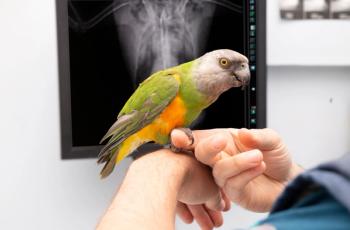
Masticatory Muscle Myositis in Dogs
A recent study described the presenting signs, treatment, and outcome for 22 cases.
Masticatory muscle myositis (MMM) is an immune-mediated myopathy characterized by inflammation, necrosis, and atrophy of the masticatory muscles. In
Patient Presentation
Patients included 13 male and 9 female dogs averaging 3.6 years and 27.7 kg in age and weight, respectively. The most commonly represented pure breeds were golden retriever and Rottweiler; 27% of dogs were classified as mixed breed.
Owners reported clinical signs lasting 4 days to 4.5 months before initial examination. Signs included lethargy, facial pain, drooling, vocal changes, gagging, exophthalmos, inappetance, and reduced play behavior. At presentation, all dogs were partially or completely unable to open the mouth, and many dogs exhibited facial pain, masticatory muscle swelling and/or atrophy, regional lymph node enlargement, and/or elevated body temperature. Blood chemistry abnormalities included hyperglobulinemia, hyperproteinemia, and increased liver enzymes.
Diagnosis and Treatment of Masticatory Muscle Myositis
Diagnosis was confirmed in all 22 dogs via immunohistochemistry and/or serum titer of 2M fiber antibodies. Diagnostic imaging performed for 12 dogs also indicated alterations in masticatory muscle size and appearance. Eleven of these dogs received a single dose of intravenous dexamethasone under general anesthesia because of a presumptive diagnosis of MMM.
Upon diagnosis of MMM, all dogs were prescribed immunosuppressive doses of oral prednisone (at least 1 mg/kg per 12 hours) for a mean of 3.5 weeks. Based on clinical signs, medication side effects, and repeat 2M fiber antibody titers, the initial prednisone dose was tapered by 25% to 50% every 2 to 8 weeks. Dose was tapered as low as possible to keep MMM in remission while minimizing side effects, such as polyuria, polydipsia, polyphagia, and diarrhea.
Patient Outcome
Masticatory muscle function and acceptable mandibular range of motion returned for 91% of the dogs for which follow-up information was available. In most cases, improvement was first observed within 1 to 3 days of treatment and plateaued after the first 4 weeks of prednisone therapy. All dogs exhibited some degree of masticatory muscle wasting at follow-up visits, and 5 dogs also developed general muscle wasting from prednisone therapy.
Prednisone was discontinued successfully in 10 dogs, whereas MMM relapse in 6 dogs required continued administration of low-dose prednisone. Relapse was not associated with initial dose or duration of immunosuppressive prednisone therapy, initial mandibular range of motion, initial 2M fiber antibody titer, or initial recovery time before relapse.
Before publication, 1 dog was euthanized due to adverse effects of prednisone administration, and 11 dogs died or were euthanized due to causes unrelated to MMM or its treatment.
Conclusions
In the study, MMM generally carried a favorable prognosis when treated promptly with immunosuppressive doses of prednisone. Dogs typically regained normal masticatory function within 4 weeks of treatment, although 27% of affected dogs experienced relapse that resolved with continued glucocorticoid therapy.
Dr. Stilwell provides freelance medical writing and aquatic veterinary consulting services through her business,
Newsletter
From exam room tips to practice management insights, get trusted veterinary news delivered straight to your inbox—subscribe to dvm360.




